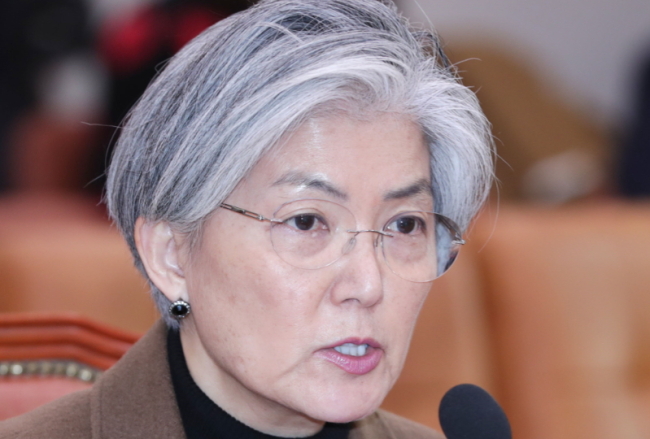Foreign Minister Kang Kyung-wha on Monday called on the North Korean regime to improve the human rights of its people during her keynote speech to the United Nations Human Rights Council in Geneva, Switzerland, her ministry said.
"North Korea must heed the call of the international community and abandon its nuclear and missile programs. It should invest more of its resources in its people and the protection and promotion of their human rights," Kang said in her speech to the high-level meeting of the 37th UN Human Rights Council session.
"My government will continue to join the international community in urging North Korea to change course, both on the security and human rights fronts," she also said, according to a script of her speech provided by the Ministry of Foreign Affairs.
 |
Foreign Minister Kang Kyung-wha (Yonhap) |
The address came as a high-level North Korean delegation, including senior ruling party official Kim Yong-chol, is on a three-day visit to the South as part of its participation in the Olympics closing ceremony on Sunday.
Kang highlighted the message of "peace and prosperity" the PyeongChang Olympics has sent out to the world and said, "it is imperative to ensure that the spirit of PyeongChang lives long after the Games so that peace can take firm root on the Korean Peninsula and the dire human rights situation in the North can be improved."
She once again called on the North to allow the arrangement of reunions of Korean families separated by the 1950-53 Korean War. She also urged the North to release South Koreans and other foreigners who are currently detained in the country.
Accusing the North Korean leadership of systemic and widespread human rights violations, since 2006 the UN council has annually adopted a resolution calling for improvement of human rights in North Korea.
Kang also raised the unresolved issue of Japan's sexual enslavement of Korean women during World War II. In a 2015 deal, Seoul and Tokyo agreed to end the long-running historical feud once and for all, but the new Moon Jae-in administration concluded that the deal inked under the previous government was "seriously flawed" and declared the bilateral issue unresolved.
"My government has humbly acknowledged that previous efforts to resolve the issue had clearly lacked a victim-centered approach," she said. "And thus, honoring the testimonies of the victims and survivors and working with their families and civil society support groups, my government will take steps to help heal their scars and restore their dignity and honor."
"My government will work with all stakeholders to keep the protection of women and girls in conflict and in peace times at the forefront of our human rights agenda," Kang said.
The foreign minister also threw her support behind the so-called MeToo movement in South Korea and the world, pledging the South Korean government's commitment to improving gender equality, protecting women's rights and abolishing wartime violence against women, the ministry said.
Marking the 70th anniversary of the Universal Declaration of Human Rights in 1948, Kang also touched on the progress and limits the world has experienced on the human rights front and expressed South Korea's will to actively contribute to enhancing the human rights situation across the world.
Ahead of the speech, Kang met with Peter Maurer, president of the International Committee of the Red Cross, in Geneva and signed an agreement on the Geneva-based humanitarian institution's South Korean branch.
The agreement gives the Korean branch, established in 2015, legal status as an international humanitarian institution, which includes the provision of legal immunity, according to the Ministry of Foreign Affairs. (Yonhap)





![[Exclusive] Hyundai Mobis eyes closer ties with BYD](http://res.heraldm.com/phpwas/restmb_idxmake.php?idx=644&simg=/content/image/2024/11/25/20241125050044_0.jpg)
![[Herald Review] 'Gangnam B-Side' combines social realism with masterful suspense, performance](http://res.heraldm.com/phpwas/restmb_idxmake.php?idx=644&simg=/content/image/2024/11/25/20241125050072_0.jpg)

